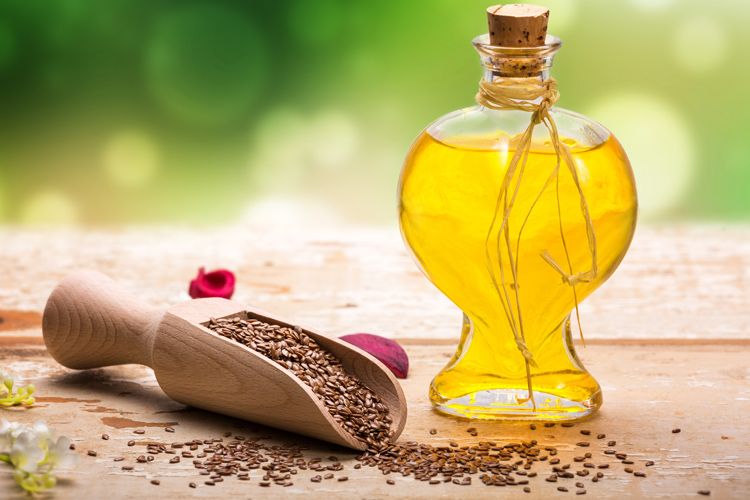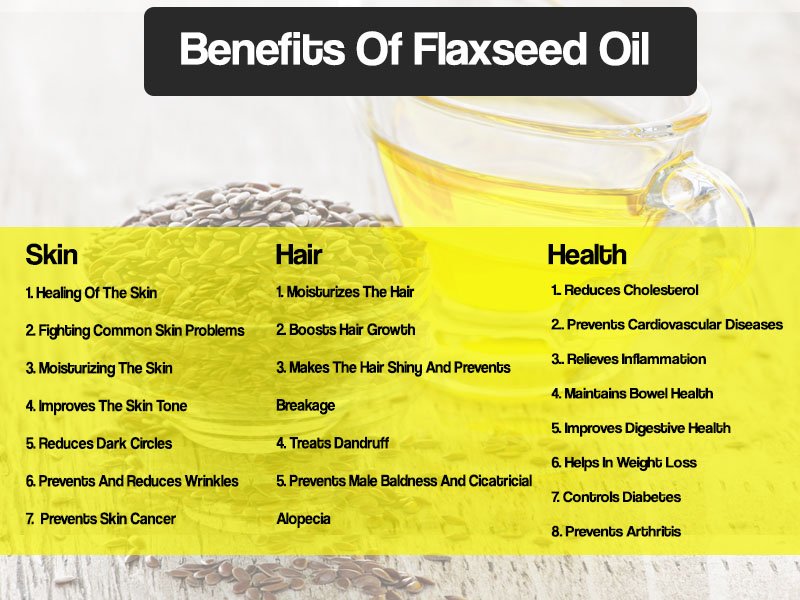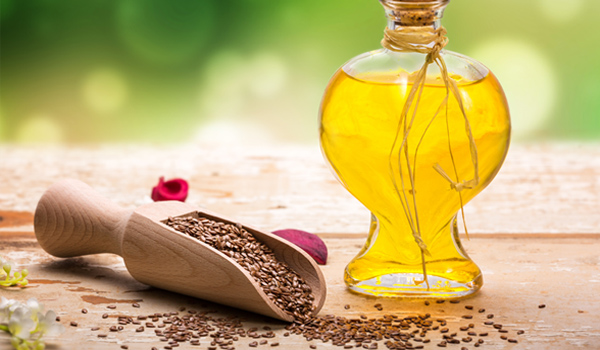
Of late, various seed oils are being evaluated critically on their health benefits and their usage is being expanded accordingly. One such oil that has caught the eye of all health buffs across the globe is Linseed oil, which is more commonly known as flaxseed oil. However, some countries like America differentiate between the two. The benefits of linseed oil and benefits of flaxseed oil are nearly the same though.
What Is Flaxseed Oil?
Flaxseed oil is a source of polyunsaturated fatty acids. It is deemed fit for human consumption as the acids and related chemicals in it help to decrease inflammation. The benefits of flaxseed oil are plenty.
We throw light on every facet of this oil to better understand its benefits on our skin, hair and health.
Flaxseed Oil Nutrition Chart
Flaxseed oil is widely coveted for its extremely high concentration of Omega-3 fatty acids; alternate sources of which are fish and chicken. Thus Linseed oil is highly recommended for vegetarians. For easy reference, we provide its nutrient chart below for the serving size of 1 tablespoon or 15 ml.
| Amount Per Serving | % Daily Value |
|---|---|
| Calories | 120 |
| Calories from Fat | 120 |
| Total Fat | 14g – 22%** |
| Saturated Fat | 1.5g – 8%** |
| Polyunsaturated Fat | 10 g – Ɨ |
| Monounsaturated Fat | 2.5g – Ɨ |
| Flax Seed Oil Typically Contains Ɨ | |
| Omega-3(Alpha-Linolenic Acid) | 7.6g – Ɨ |
| Omega-6 (Linoleic Acid) | 1.9g – Ɨ |
| Omega-9 (Oleic Acid) | – |
| ** Percent Daily Values are based on a 2,000 calorie diet. | |
| Ɨ Daily Value not established | |
Apart from Omega 3 essential fatty acids, the oil has Lignans which are touted to have about 8000 times more antioxidant properties that any other available plant derivatives.
Benefits of Flaxseed Oil
Flaxseed Oil has been used since centuries, especially in Mediterranean region for its amazing benefits of health skin as well as hair. At this point, it needs to be stated that this oil is never cooked. The oil is best taken as drizzles over salads or for oral consumption. Thanks to its nutty and slightly sweet flavor, making it a part of your daily diet is no torture! To reap its benefits, it is taken internally and even applied externally but never put on flame. For further enlightening, here is the list of its benefits on our skin, hair and health.

[Also Read: Flax Seeds Weight Loss]
Benefits Of Flaxseed Oil For Skin
To reap the benefits of Flaxseed Oil, it can be easily added to skin care products like face wash, shower gels, moisturizers, sunscreen, face-packs etc. or simply be applied topically on any area. Few of its leading benefits are:-

1. Healing of the skin
- How it works– Thanks to its high level of omega-3 fatty acids and high anti-inflammatory properties, linseed oil can accelerate the speed of wound healing and can easily minimize skin irritation, inflammation, redness or rashes if any.
- How to use-Topically applying a few drops of Flaxseed Oil tobring in relief.
2. Fighting common skin problems
- How it works– Acne, psoriasis etc. mostly erupts due to skin inflammation but the alpha-linolenic acid in the oil can effectively take care of it.The omega-3 content of the oil nourishes the skin cells and boosts the immunity system. They open the clogged skin pores and facilitate and accelerate detoxification of the skin. The lignans of the oil are touted as asphytoestrogens which contain anti-estrogenic properties. This aids in balancing the activity of the estrogen hormones which is the root cause of all skin problems. Trust Flaxseed Oil to kiss away all such woes!
- How to use– The oil can be applied to the skin once or twice a week, kept for about 15 minutes and rinsed off well! The change in skin conditions is bound to leave you happy! You can also ingest its capsules daily or its loose oil as per recommended dosage to reap the benefits internally.
[Also Read: Flaxseed Oil for Moles Treatment]
3. Moisturizing the skin
- How it works– It infuses life and radiance back to dull looking skin. Exposure to sunlight, pollution and everyday stress is bound to leave your skin dull and dark. Its high inflammatory index, antioxidants and rehydrating properties restores the skin quality and tone in no time.
- How to use– Mixing a few drops of linseed oil with any suitable moisturizer and massaging the skin and face with it will not only help keep the moisture locked in but would also block any irritants from entering the pores.
4. Improves the skin tone
- How it works– Exposure to sunlight, pollution and everyday stress is bound to leave your skin dull and dark. There is no better and effective solution than flax seed oil to infuse life and radiance back into it. Its high inflammatory index, antioxidants and rehydrating properties restores the skin quality and tone in no time.
- How to use-Massage the skin with a few drops of linseed oil for about 4-5 minutes. Leave it for about 15 minutes or best, overnight. Rinse off with lukewarm water. Do this atleast twice a week.
5. Reduces dark circles
- How it works– Similar to the skin tone, its high omega-3 content, antioxidants and other properties helps reduce the melanin production in the under-eye area.
- How to use– Massaging the eye area gently with a drop of flax seed daily will make the dark circles disappear significantly and add brightness to the area like never before.

Source: allremedies.com
6. Prevents and reduces wrinkles
- How it works– Dry skin increases the risk of wrinkles and fine lines developing on the skin. However, the protein and fat content of linseed oil is terrific for preventing wrinkles and fine lines as well as reducing them. Its topical application enhances the skin’s elasticity, firmness, texture and tone. It plumps and repairs the skin’s cell. It can also help fade away any scars and marks on skin.
- How to take/use– Apply the oil topically by mixing it with your moisturizer. Ingest it by adding it to your smoothie or as supplements.
7. Prevents skin cancer
- How it works– Researchers have already established that flaxseed oil can protect the skin tissues from the radiation of the sun. This goes a long way in reducing all skin damages incurred due to sun exposure. Its high antioxidants also fight the free radicals of the skin which in turn helpsto prevent skin cancer.
- How to use– Use it topically as well as ingest it as supplements daily.
Flaxseed Oil benefits for hair
Linseed oil is one of the most nutrient-dense oil available in the market today. Its high anti-oxidants, anti-inflammatory properties and omega-3 content can promote a healthy, strong and thick mane to flaunt! Like castor oil, it can add real shine and moisture to your hair but does not leave any residue behind which causes rashes or breakouts on your scalp! This light oil is truly beneficial to your hair both inside and outside. Few of its benefits include:-
1. Moisturizes the hair
- How it works-Linseed oil is a storehouse of nutrients with omega-3 fatty acids, protein, fiber minerals and essential minerals. When applied, it moisturizes every strand internally as well as externally.
- How to use– Mixed with honey, it moisturizes your hair from deep within to leave it as soft as silk. This mixture should be appliedon clean hair, massaged , left for about 10—15 minutes and then rinsed off well. Using its gel form is also highly effective in moisturizing the hair.
2. Boosts hair growth
- How it works- The rich Vitamin E content of linseed oil promotes the growth of the hair capillaries. It can help moisturize and nourish the hair from the scalp to the hair roots, shaft and right down to the hair ends. Because of even and adequate supply of nutrient to every strand of hair, down to the ends, it can expedite hair growth and boost the elasticity and strength of the hair.
- How to use– For this,the oil can be consumed internally as well as applied externally as a hot oil treatment, as a hair spritz, as a mask for dead ends etc.

Source: diyhealthremedy.com
3. Makes the hair shiny and prevents breakage
- How it works– The biggest cause of hair fall is dry and brittle hair. The high omega-3 alpha linolenic acid content of the oil makes the hair shiny and strong.
- How to use– It can easily be used with any of the hair masks at least once a week.
[sc:mediad]
3. Treats dandruff
- How it works-The anti-inflammatory properties of the linseed oil have proven to reduce various scalp conditions like dandruff and eczema. The oil even stimulates the production of sebum in the scalp which helps fight dandruff and flaking.
- How to use– For better results, equal quantity of linseed oil and sugar can be mixed and gently massaged ontothe scalp. After about 20 minutes, the hair should be shampooed and sprayed with a mixture. A mixture of two cups of water and two tablespoons of cider vinegar and hydrogen peroxide each. Massage well and rinse off the mixture after 20 minutes. The treatment can be done twice or thrice a week to eliminate the problem completely.
4. Prevents male baldness and Cicatricial alopecia
- How it works-Intake of flax seed oil can actually prevent cicatricial alopecia, a condition in which the hair follicles gets damaged severely to lead to total baldness. Its alpha-linolenic acid inhibits the production of the 5 alpha reductase enzymes which is responsible for converting the testosterone hormone into Dihydrotestosterone (DHT). This DHT is responsible for the shrinkage of the hair follicles and ultimately hair fall. The oil also prevents hair loss due to Telogen effluvium.
- How to use– Regularly apply the oil topically and ingest it as supplements.
Flaxseed Oil benefits for health
One tablespoon of Linseed oil in the morning and evening each can offer you plenty of therapeutic and health benefits. Listed below are some of its top health benefits.
1. Reduces cholesterol
- How it works– Of all available oils in the market, linseed oil has the highest number of omega- 3 fatty acids. This is extremely important as it, along with fibers and lignan, lowers the bad cholesterol i.e. LDL as well as triglycerides level from the blood. The oil is abundant in both soluble and insoluble fibers. The soluble fibers also aid in blocking the absorption of cholesterol in the blood
- How to use– Ingest the oil or its capsules daily as recommended by the manufacturer or your doctor.
2. Prevents cardiovascular diseases
- How it works-Because of lowering the blood cholesterol as well as triglycerides level in the blood, the oil helps in controlling the blood pressure and all associated diseases of the heart. Regular consumption of the oil reduces the risk of heart attack and strokes. Often high level of triglycerides and cholesterol, lack of exercises, oxidative stress and numerous other factors lead to clogged arteries. This affects the blood circulation and is the root cause of all heart conditions. Regular consumption of the oil de-clogs them and keeps them strong, elastic and flexible. It also helps promote regular heart beat. The oil is unmatched in its cardio-protective abilities.
- How to use– As per manufacturer’s or doctor’s instructions.

Source: freshdesignpedia.com
2. Precaution for diabetics
Intake of a large dose of flaxseed oil can lower the blood sugar levels. This can turn grave when taken with diabetic medicines. Hence the dosage and permission must be taken from a doctor before the oil is consumed by a diabetic patient.
3. Pregnancy
Otherwise extremely beneficial for women, linseed oil is generally not recommended for pregnant women, especially in their second and third trimester. This is because the oil can cause premature birth. It is also not advised during breast feeding because of its hormonal contributions though no study reports have been established yet.
4. Allergic reactions
Few people on consuming linseed oil complain of some allergic reactions like hives, difficulty in breathing, rashes, itching, swelling of the face, lips, tongue, throat etc. However, such instances are extremely low.
5. Gastrointestinal problems
These are often manifested more with consumption of flax seeds rather than linseed oil. However, few complain of symptoms like bloating, stomach upset, diarrhea, nausea, stomach ache etc. The symptoms generally surface if a person has taken a high dosage of linseed oil like 30 ml at one go. It is generally advisable to start with small dosages and then gradually proceed to the recommended dosage.
Precautions While Consuming Linseed Oil
- While there is no fixed dosage of linseed oil yet, it is advised to always start in small dose and then increase its consumption. This becomes especially crucial if your diet has been lacking omega-3 fatty acid earlier. Too much of it can disturb its balance in the blood and cause complications.
- Generally, one to two tablespoons of linseed oil once or twice daily is recommended. While it is available in capsule form, its bottled version is recommended. This is because the oil can turn rancid and it is not possible to ascertain it from its capsule form. Rancid oil can cause side-effects.
- Only that oil that has been marked safe for human consumption should be consumed. This is because a part of flax seed is poisonous and contains traces of cyanide.
- It is best to intake linseed oil in several small portions throughout the day instead of one or two large doses.
- An increased fluid and water intake is strongly recommended with consumption of linseed oil.
- Women suffering from breast cancer, uterine or even ovarian cancer and endometriosis should consume the oil only under the strict supervision of a doctor as it can act like the estrogen hormone in the body.
- Men with prostate cancer should not consume it as it has conflicting research about its effect on prostate cancer.
- People suffering from bowel obstruction, narrowed esophagus or inflamed bowel should avoid the linseed oil as well as seed consumption as its high fiber content can make the situation worse.
- People under any kind of medications must always consult their doctor before consuming the oil because of its possible interactions.
- Never take the oil if it has a bad smell or a foul taste. It implies that the oil has gone rancid and will have adverse effects.
- The oil should not be consumed during cyclosporine (Sandimmune) therapy since its omega-3 fatty acid can cause adverse reactions despite reducing the toxic side effects of the medicine in transplant patients.
I’m sure by the end of it you have realized what a boon flaxseed oil is to us! Let us know your thoughts in the comments below.
Recommended Articles
Moringa Oil Benefits For Health, Hair, Skin And Nails
Fish Oil for Hair, Skin & Health Benefits
Castor Oil Benefits For Hair, Skin, Eye And Health
Olive Oil Benefits For Hair, Skin, Face And Health
Benefits And Uses Of Avocado Oil
Refined Coconut Oil vs Unrefined Coconut Oil
Jojoba Oil Benefits For Skin And Hair
Benefits And Uses Of Peppermint Oil

1 comment
Is flaxseed oil good during pregnancy?